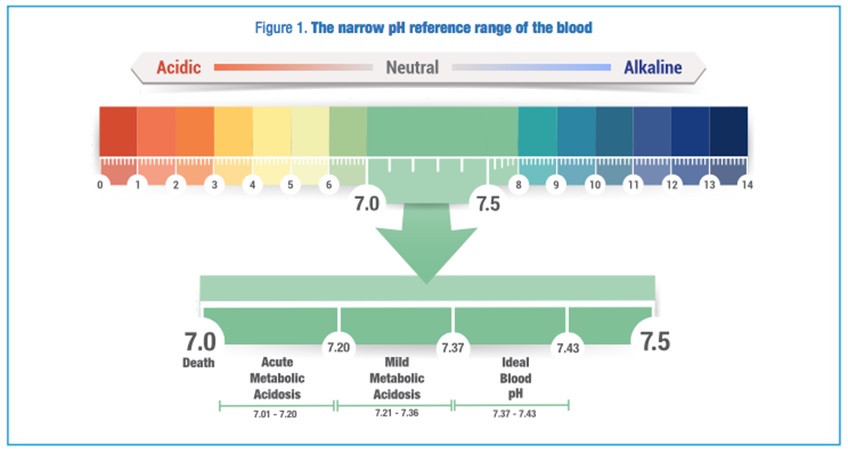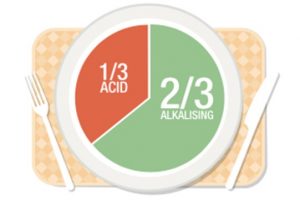Do you suffer from fatigue, muscle pain, loss of muscle mass, osteoporosis or osteopenia, arthritis, anxiety, heightened stress response, insomnia, mental fatigue, pain, blood sugar problems, kidney disease, hypertension, liver disease or cardiovascular disease?
These are all symptoms of chronic metabolic acidosis or CMA. This modern epidemic poses a serious threat to every aspect of health. Watch this brief video to better understand acidosis and how it affects you!
What are pH and acidosis?
In chemistry, the pH scale measures how acidic or alkaline a substance is. This is dependent on hydrogen as the primary acidic ion. You don’t need a lesson in chemistry to appreciate how important the correct pH is to the functioning of our body. While some organs or tissues allow for a small deviation in pH, others like our blood or cerebrospinal fluid (the fluid that bathes our brain) do not.

While metabolic acidosis is a life-threatening condition, there is a more insidious low-grade and chronic form of acidosis where the pH of the blood and tissues drop, but still remain within the ‘low-normal’ range – this is known as Chronic Metabolic Acidosis (CMA) or chronic acidosis.
Why is pH so important?
We are currently facing a dramatic increase in chronic disease, including cardiovascular disease, metabolic syndrome and diabetes – all of which are reportedly due to modern lifestyle practices, such as lack of proper exercise and poor diet.2
Evidence highlights how pH imbalances in the body, predominantly related to diet, cause multiple metabolic disturbances and chronic disease3.
Maintaining a healthy pH balance has been shown to improve sports performance, promote healthy ageing, reduce the risk of chronic disease, support the brain and nervous system supporting mental health.
Every cell in the body is constantly in a state of activity. The cells require a stable environment to ensure that they can function properly: factors that determine how efficient cells can function include body temperature, composition of the fluids and the correct pH. Over 7000 metabolic processes in the body depend on enzymes6. These enzymes are responsible for energy production, nutrition and almost all aspects of metabolism. Enzymes require a specific pH level to work efficiently. Changes in pH may not only impair enzyme function, but even stop some essential metabolic processes leading to fatigue and metabolic dysfunction.6,7
Multiple evidence confirms that a chronic state of low-grade metabolic acidosis is associated with the development of metabolic alterations such as insulin resistance, diabetes, hypertension, chronic kidney disease, bone disorders and loss of muscle mass as well as many other chronic health conditions.3,4,9
The following diagram shows the specific pH required in the organs of our digestive tract. When this pH changes, imbalances and even disease may result. For example, should the pH of your stomach acid rise it may result in impaired digestive capacity, reflux and heartburn.

What causes CMA?
The number one cause of chronic metabolic acidosis is an unbalanced diet.3,19 CMA can also be caused by:
- stress
- weight loss diets and fasting
- insufficient or excessive exercise
- mitochondrial dysfunction and chronic diseases
- diabetes
 kidney function disorders
kidney function disorders
Our ancestral diets were high in highly alkaline, mineral-rich plant-based diets, whereas our modern diet is high in acid-forming highly processed foods like cereal grains, simple sugars, salt, chloride and diets poor in fibre and minerals.
Modern diets reflect an evolutionary mismatch between nutrient composition and genetically determined nutritional requirements for optimal acid-base status.8
Protein-rich foods such as meat, fish, dairy products and cereals are metabolised to form acid in the body. Phosphate-containing compounds found in meat, sausage products and soft drinks also have an acidic effect on the body.3,29
Fasting and ketogenic diets may increase the acid burden. Calorie restriction to break down body fat leads to the production of ketones or keto acids which place a significant acid burden on the metabolism. Similarly, ketogenic diets cause high levels of acidity. High-protein:low carbohydrate diets or those with high protein meal substitutes or supplements may add an additional acid load. 28 If there is insufficient supply of alkaline bases to compensate for the acidity, CMA may occur, even impairing metabolic capacity and muscle mass making further weight loss more difficult.31-33
Fasting also causes a metabolic shift away from glucose towards keto acids. Any form of fasting or diet is best supervised by a healthcare professional.
Excessive exercise or endurance sports, as well as stress3,9, also contribute to acidosis.
Acidity affects every part of your body
- Osteo and rheumatoid arthritis, pain and resulting loss of quality of life
- Blood sugar balance, insulin resistance and diabetes
- Brain and nervous system; emotional problems, low mood, hyperactivity, Parkinson’s Disease, reduced cognition and memory and Alzheimer’s.
- Cancer: The WHO acknowledges that 50% of all cancers are preventable and can be reduced with dietary and lifestyle changes.61 Alkaline diets such as those high in fruits and vegetables have an independentprotective effect against many cancers.61
- Cardiovascular disease, hypertension
- Energy
- Digestion, loss of microbial diversity and enzyme activity
- Gout
- Immune dysfunction
- Inflammation
- Kidney health
- Liver health, Non Alcoholic Fatty Liver Disease
- Physical performance, muscle mass, strength
- Respiratory health due to thick/tenacious mucous, mucous plugging, bacterial colonisation, COPD
- Osteoporosis, reduction of bone mineral density
- Skin health
- Thyroid
- Weight management
How to prevent CMA
- Diet: An acid-forming food is not a bad choice. Choose an acid-forming food as your main protein source, then balance it out with a greater selection of alkalising foods.
Avoid processed foods especially simple sugars, highly processed grains like wheat (white bread, pasta, biscuits, cakes); caffeine, soft drinks, energy drinks, lollies and alcohol.Fruit and vegetables are essentially the only alkaline foods. They contain minerals which are responsible for the alkalising effect.
Here is an easy reference table on which foods become acidic and which are alkalising
http://truemedicine.com.au/wp-content/uploads/Acid_Alkaline_foods.pdf

- Lifestyle strategies: deep breathing exercises; moderate exercise (with adequate recovery time); and stress management activities, including meditation and mindfulness. Ensure you get sufficient and good quality sleep every night.
- Supplementation: in some cases it may be difficult to effectively reduce the acid burden in the body through dietary changes alone – in these cases, the addition of alkalising mineral supplementation is advisable.
Always consult a qualified natural health practitioner before making changes to your diet and lifestyle and NEVER self prescribe.
